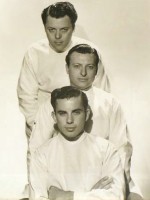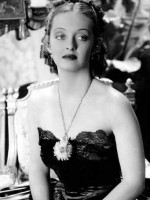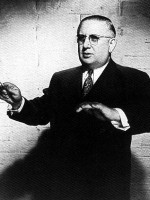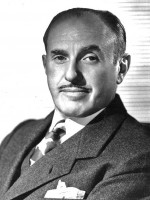James Cagney is a Actor, Director and Producer American born on 17 july 1899 at New York City (USA)

James Francis Cagney, Jr. (July 17, 1899 – March 30, 1986) was an American actor and dancer, both on stage and in film, though he had his greatest impact in film. Known for his consistently energetic performances, distinctive vocal style, and deadpan comic timing, he won acclaim and major awards for a wide variety of performances. He is best remembered for playing multifaceted tough guys in movies such as The Public Enemy (1931), Taxi! (1932), Angels with Dirty Faces (1938), and White Heat (1949) and was even typecast or limited by this view earlier in his career. In 1999, the American Film Institute ranked him eighth among its list of greatest male stars of Classic Hollywood Cinema. Orson Welles said of Cagney, "[he was] maybe the greatest actor who ever appeared in front of a camera", and Stanley Kubrick considered him to be one of the best actors of all time.
In his first professional acting performance, Cagney danced costumed as a woman in the chorus line of the 1919 revue Every Sailor. He spent several years in vaudeville as a dancer and comedian, until he got his first major acting part in 1925. He secured several other roles, receiving good notices, before landing the lead in the 1929 play Penny Arcade. After rave reviews, Warner Bros. signed him for an initial $500-a-week, three-week contract to reprise his role; this was quickly extended to a seven-year contract.
Cagney's seventh film, The Public Enemy, became one of the most influential gangster movies of the period. Notable for a famous scene in which Cagney pushes a grapefruit against his co-star's face, the film thrust him into the spotlight. He became one of Hollywood's biggest stars and one of Warner Bros.' biggest contracts. In 1938, he received his first Academy Award for Best Actor nomination, for Angels with Dirty Faces for his subtle portrayal of the tough guy/man-child Rocky Sullivan. In 1942, Cagney won the Oscar for his energetic portrayal of George M. Cohan in Yankee Doodle Dandy. He was nominated a third time in 1955 for Love Me or Leave Me. Cagney retired from acting and dancing in 1961 to spend time on his farm with his family. He exited retirement, 20 years later, for a part in the 1981 movie Ragtime, mainly to aid his recovery from a stroke.
Cagney walked out on Warner Bros. several times over the course of his career, each time returning on much improved personal and artistic terms. In 1935, he sued Warners for breach of contract and won. This was one of the first times an actor prevailed over a studio on a contract issue. He worked for an independent film company for a year while the suit was being settled—and established his own production company, Cagney Productions, in 1942, before returning to Warners four years later. In reference to Cagney's refusal to be pushed around, Jack L. Warner called him "the Professional Againster". Cagney also made numerous morale-boosting troop tours before and during World War II, and was president of the Screen Actors Guild for two years.
Cagney's son married Jill Lisbeth Inness in 1962. The couple had two children, James III and Cindy. Cagney Jr. died from a heart attack on January 27, 1984 in Washington, DC, two years before his father's death. He had become estranged from his father and had not seen or talked to him since 1982.
Cagney's daughter Cathleen married Jack W. Thomas in 1962. She, too, was estranged from her father during the final years of his life. She died on August 11, 2004.
As a young man, Cagney became interested in farming – sparked by a soil conservation lecture he had attended – to the extent that during his first walkout from Warner Bros., he helped to found a 100-acre (0.40 km) farm in Martha's Vineyard. Cagney loved that no concrete roads surrounded the property, only dirt tracks. The house was rather run-down and ramshackle, and Billie was initially reluctant to move in, but soon came to love the place, as well. After being inundated by movie fans, Cagney sent out a rumor that he had hired a gunman for security. The ruse proved so successful that when Spencer Tracy came to visit, his taxi driver refused to drive up to the house, saying, "I hear they shoot!" Tracy had to go the rest of the way on foot.
In 1955, having shot three films, Cagney bought a 120-acre (0.49 km) farm in Stanfordville, Dutchess County, New York, for $100,000. Cagney named it Verney Farm, taking the first syllable from Billie's maiden name and the second from his own surname. He turned it into a working farm, selling some of the dairy cattle and replacing them with beef cattle. He expanded it over the years to 750 acres (3.0 km). Such was Cagney's enthusiasm for agriculture and farming that his diligence and efforts were rewarded by an honorary degree from Florida's Rollins College. Rather than just "turning up with Ava Gardner on my arm" to accept his honorary degree, Cagney turned the tables upon the college's faculty by writing and submitting a paper on soil conservation.
Cagney, born in 1899 (prior to widespread use of automobiles) loved horses from childhood. As a child, he often sat on the horses of local deliverymen, and rode in horse-drawn streetcars with his mother. As an adult, well after horses were replaced by automobiles as the primary mode of transportation, Cagney raised horses on his farms, specializing in Morgans, a breed of which he was particularly fond.
Cagney was a keen sailor and owned boats harbored on both US coasts, His joy in sailing, however, did not protect him from occasional seasickness—becoming ill, sometimes, on a calm day while weathering rougher, heavier seas at other times. Cagney greatly enjoyed painting, and claimed in his autobiography that he might have been happier, if somewhat poorer, as a painter than a movie star. The renowned painter Sergei Bongart taught Cagney in his later life and owned two of Cagney's works. Cagney often gave away his work, but refused to sell his paintings, considering himself an amateur. He signed and sold only one painting, purchased by Johnny Carson to benefit a charity.
Political views
In his autobiography, Cagney said that as a young man, he had no political views, since he was more concerned with where the next meal was coming from. However, the emerging labor movement of the '20s and '30s soon forced him to take sides. The first version of the National Labor Relations Act was passed in 1935 and growing tensions between labor and management fueled the movement. Fanzines in the 1930s, however, described his politics as "radical". This somewhat exaggerated view was enhanced by his public contractual wranglings with Warner Bros. at the time, his joining of the Screen Actors Guild in 1933, and his involvement in the revolt against the so-called "Merriam tax". The "Merriam tax" was an underhanded method of funneling studio funds to politicians; during the 1934 Californian gubernatorial campaign, the studio executives would 'tax' their actors, automatically taking a day's pay from their biggest-earners, ultimately sending nearly half a million dollars to the gubernatorial campaign of Frank Merriam. Cagney (as well as Jean Harlow) publicly refused to pay and Cagney even threatened that, if the studios took a day's pay for Merriam's campaign, he would give a week's pay to Upton Sinclair, Merriam's opponent in the race.
He supported political activist and labor leader Thomas Mooney's defense fund, but was repelled by the behavior of some of Mooney's supporters at a rally. Around the same time, he gave money for a Spanish Republican Army ambulance during the Spanish Civil War, which he put down to being "a soft touch". This donation enhanced his liberal reputation. He also became involved in a "liberal group...with a leftist slant," along with Ronald Reagan. However, when Reagan and he saw the direction the group was heading, they resigned on the same night.
Cagney was accused of being a communist sympathizer in 1934, and again in 1940. The accusation in 1934 stemmed from a letter police found from a local Communist official that alleged that Cagney would bring other Hollywood stars to meetings. Cagney denied this, and Lincoln Steffens, husband of the letter's writer, backed up this denial, asserting that the accusation stemmed solely from Cagney's donation to striking cotton workers in the San Joaquin Valley. William Cagney claimed this donation was the root of the charges in 1940. Cagney was cleared by U.S. Representative Martin Dies, Jr., on the House Un-American Activities Committee.
Cagney became president of the Screen Actors Guild in 1942 for a two-year term. He took a role in the Guild's fight against the Mafia, which had begun to take an active interest in the movie industry. His wife, Billie Vernon, once received a phone call telling her that Cagney was dead. Cagney alleged that, having failed to scare off the Guild and him, they sent a hitman to kill him by dropping a heavy light onto his head. Upon hearing of the rumor of a hit, George Raft made a call, and the hit was supposedly canceled.
During World War II, Cagney raised money for war bonds by taking part in racing exhibitions at the Roosevelt Raceway and selling seats for the premiere of Yankee Doodle Dandy. He also let the Army practice maneuvers at his Martha's Vineyard farm.
After the war, Cagney's politics started to change. He had worked on Democrat Franklin D. Roosevelt's presidential campaigns, including the 1940 presidential election against Wendell Willkie. However, by the time of the 1948 election, he had become disillusioned with Harry S. Truman, and voted for Thomas E. Dewey, his first non-Democratic vote. By 1980, Cagney was contributing financially to the Republican Party, supporting his friend Ronald Reagan's bid for the presidency in the 1980 election. As he got older, he became more and more conservative, referring to himself in his autobiography as "arch-conservative." He regarded his move away from liberal politics as "...a totally natural reaction once I began to see undisciplined elements in our country stimulating a breakdown of our system... Those functionless creatures, the hippies ... just didn't appear out of a vacuum.
Source : Wikidata
James Cagney

- Infos
- Photos
- Best films
- Family
- Characters
- Awards
Birth name James Francis Cagney
Nationality USA
Birth 17 july 1899 at New York City (USA)
Death 30 march 1986 (at 86 years) at New York City (USA)
Awards Academy Award for Best Actor, Presidential Medal of Freedom
Nationality USA
Birth 17 july 1899 at New York City (USA)
Death 30 march 1986 (at 86 years) at New York City (USA)
Awards Academy Award for Best Actor, Presidential Medal of Freedom
In his first professional acting performance, Cagney danced costumed as a woman in the chorus line of the 1919 revue Every Sailor. He spent several years in vaudeville as a dancer and comedian, until he got his first major acting part in 1925. He secured several other roles, receiving good notices, before landing the lead in the 1929 play Penny Arcade. After rave reviews, Warner Bros. signed him for an initial $500-a-week, three-week contract to reprise his role; this was quickly extended to a seven-year contract.
Cagney's seventh film, The Public Enemy, became one of the most influential gangster movies of the period. Notable for a famous scene in which Cagney pushes a grapefruit against his co-star's face, the film thrust him into the spotlight. He became one of Hollywood's biggest stars and one of Warner Bros.' biggest contracts. In 1938, he received his first Academy Award for Best Actor nomination, for Angels with Dirty Faces for his subtle portrayal of the tough guy/man-child Rocky Sullivan. In 1942, Cagney won the Oscar for his energetic portrayal of George M. Cohan in Yankee Doodle Dandy. He was nominated a third time in 1955 for Love Me or Leave Me. Cagney retired from acting and dancing in 1961 to spend time on his farm with his family. He exited retirement, 20 years later, for a part in the 1981 movie Ragtime, mainly to aid his recovery from a stroke.
Cagney walked out on Warner Bros. several times over the course of his career, each time returning on much improved personal and artistic terms. In 1935, he sued Warners for breach of contract and won. This was one of the first times an actor prevailed over a studio on a contract issue. He worked for an independent film company for a year while the suit was being settled—and established his own production company, Cagney Productions, in 1942, before returning to Warners four years later. In reference to Cagney's refusal to be pushed around, Jack L. Warner called him "the Professional Againster". Cagney also made numerous morale-boosting troop tours before and during World War II, and was president of the Screen Actors Guild for two years.
Biography
In 1920, Cagney was a member of the chorus for the show Pitter Patter, where he met Frances Willard "Billie" Vernon. They married on September 28, 1922, and the marriage lasted until his death in 1986. Frances Cagney died in 1994. In 1941, they adopted a son whom they named James Cagney, Jr., and later a daughter, Cathleen "Casey" Cagney. Cagney was a very private man, and while he was very willing to give the press opportunities for photographs, he generally spent his time out of the public eye.Cagney's son married Jill Lisbeth Inness in 1962. The couple had two children, James III and Cindy. Cagney Jr. died from a heart attack on January 27, 1984 in Washington, DC, two years before his father's death. He had become estranged from his father and had not seen or talked to him since 1982.
Cagney's daughter Cathleen married Jack W. Thomas in 1962. She, too, was estranged from her father during the final years of his life. She died on August 11, 2004.
As a young man, Cagney became interested in farming – sparked by a soil conservation lecture he had attended – to the extent that during his first walkout from Warner Bros., he helped to found a 100-acre (0.40 km) farm in Martha's Vineyard. Cagney loved that no concrete roads surrounded the property, only dirt tracks. The house was rather run-down and ramshackle, and Billie was initially reluctant to move in, but soon came to love the place, as well. After being inundated by movie fans, Cagney sent out a rumor that he had hired a gunman for security. The ruse proved so successful that when Spencer Tracy came to visit, his taxi driver refused to drive up to the house, saying, "I hear they shoot!" Tracy had to go the rest of the way on foot.
In 1955, having shot three films, Cagney bought a 120-acre (0.49 km) farm in Stanfordville, Dutchess County, New York, for $100,000. Cagney named it Verney Farm, taking the first syllable from Billie's maiden name and the second from his own surname. He turned it into a working farm, selling some of the dairy cattle and replacing them with beef cattle. He expanded it over the years to 750 acres (3.0 km). Such was Cagney's enthusiasm for agriculture and farming that his diligence and efforts were rewarded by an honorary degree from Florida's Rollins College. Rather than just "turning up with Ava Gardner on my arm" to accept his honorary degree, Cagney turned the tables upon the college's faculty by writing and submitting a paper on soil conservation.
Cagney, born in 1899 (prior to widespread use of automobiles) loved horses from childhood. As a child, he often sat on the horses of local deliverymen, and rode in horse-drawn streetcars with his mother. As an adult, well after horses were replaced by automobiles as the primary mode of transportation, Cagney raised horses on his farms, specializing in Morgans, a breed of which he was particularly fond.
Cagney was a keen sailor and owned boats harbored on both US coasts, His joy in sailing, however, did not protect him from occasional seasickness—becoming ill, sometimes, on a calm day while weathering rougher, heavier seas at other times. Cagney greatly enjoyed painting, and claimed in his autobiography that he might have been happier, if somewhat poorer, as a painter than a movie star. The renowned painter Sergei Bongart taught Cagney in his later life and owned two of Cagney's works. Cagney often gave away his work, but refused to sell his paintings, considering himself an amateur. He signed and sold only one painting, purchased by Johnny Carson to benefit a charity.
Political views
In his autobiography, Cagney said that as a young man, he had no political views, since he was more concerned with where the next meal was coming from. However, the emerging labor movement of the '20s and '30s soon forced him to take sides. The first version of the National Labor Relations Act was passed in 1935 and growing tensions between labor and management fueled the movement. Fanzines in the 1930s, however, described his politics as "radical". This somewhat exaggerated view was enhanced by his public contractual wranglings with Warner Bros. at the time, his joining of the Screen Actors Guild in 1933, and his involvement in the revolt against the so-called "Merriam tax". The "Merriam tax" was an underhanded method of funneling studio funds to politicians; during the 1934 Californian gubernatorial campaign, the studio executives would 'tax' their actors, automatically taking a day's pay from their biggest-earners, ultimately sending nearly half a million dollars to the gubernatorial campaign of Frank Merriam. Cagney (as well as Jean Harlow) publicly refused to pay and Cagney even threatened that, if the studios took a day's pay for Merriam's campaign, he would give a week's pay to Upton Sinclair, Merriam's opponent in the race.
He supported political activist and labor leader Thomas Mooney's defense fund, but was repelled by the behavior of some of Mooney's supporters at a rally. Around the same time, he gave money for a Spanish Republican Army ambulance during the Spanish Civil War, which he put down to being "a soft touch". This donation enhanced his liberal reputation. He also became involved in a "liberal group...with a leftist slant," along with Ronald Reagan. However, when Reagan and he saw the direction the group was heading, they resigned on the same night.
Cagney was accused of being a communist sympathizer in 1934, and again in 1940. The accusation in 1934 stemmed from a letter police found from a local Communist official that alleged that Cagney would bring other Hollywood stars to meetings. Cagney denied this, and Lincoln Steffens, husband of the letter's writer, backed up this denial, asserting that the accusation stemmed solely from Cagney's donation to striking cotton workers in the San Joaquin Valley. William Cagney claimed this donation was the root of the charges in 1940. Cagney was cleared by U.S. Representative Martin Dies, Jr., on the House Un-American Activities Committee.
Cagney became president of the Screen Actors Guild in 1942 for a two-year term. He took a role in the Guild's fight against the Mafia, which had begun to take an active interest in the movie industry. His wife, Billie Vernon, once received a phone call telling her that Cagney was dead. Cagney alleged that, having failed to scare off the Guild and him, they sent a hitman to kill him by dropping a heavy light onto his head. Upon hearing of the rumor of a hit, George Raft made a call, and the hit was supposedly canceled.
During World War II, Cagney raised money for war bonds by taking part in racing exhibitions at the Roosevelt Raceway and selling seats for the premiere of Yankee Doodle Dandy. He also let the Army practice maneuvers at his Martha's Vineyard farm.
After the war, Cagney's politics started to change. He had worked on Democrat Franklin D. Roosevelt's presidential campaigns, including the 1940 presidential election against Wendell Willkie. However, by the time of the 1948 election, he had become disillusioned with Harry S. Truman, and voted for Thomas E. Dewey, his first non-Democratic vote. By 1980, Cagney was contributing financially to the Republican Party, supporting his friend Ronald Reagan's bid for the presidency in the 1980 election. As he got older, he became more and more conservative, referring to himself in his autobiography as "arch-conservative." He regarded his move away from liberal politics as "...a totally natural reaction once I began to see undisciplined elements in our country stimulating a breakdown of our system... Those functionless creatures, the hippies ... just didn't appear out of a vacuum.
Best films
Usually with
Filmography of James Cagney (79 films)
Actor
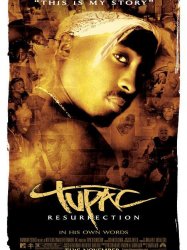
Tupac: Resurrection (2003)
, 1h52Origin USA
Genres Documentary, Musical
Themes Dance films, Films about music and musicians, Documentary films about music and musicians, Documentaire sur une personnalité, Hip hop films, Musical films
Actors Tupac Shakur, Snoop Dogg, Dr. Dre, 50 Cent, Eminem, Suge Knight
Roles Self (archival)
Rating78%





Le documentaire présente la vie de Tupac Amaru Shakur du point de vue du rappeur lui-même. Narrateur et protagoniste du film, il raconte sa vie, ses actions et son art avec ses propres mots. Un peu différent du DVD "Thug Angel", mais beaucoup plus apprécié.

The Kid Stays in the Picture (2002)
, 1h33Directed by Nanette Burstein, Brett Morgen
Origin USA
Genres Documentary
Themes Documentary films about business, Documentary films about the film industry, Documentaire sur une personnalité
Actors Robert Evans, Eddie Albert, Norma Shearer, Ali MacGraw, Francis Ford Coppola, Catherine Deneuve
Roles Self (archive footage)
Rating72%





The book chronicles Evans' rise from childhood to radio star to film star to production chief of Paramount Pictures to independent producer, his marriage to Ali MacGraw, his downfall including his 1980 cocaine bust and implication in the murder of Roy Radin, aka "The Cotton Club Murder", his banishment from Paramount Pictures, and his return to the studio in the early 1990s.
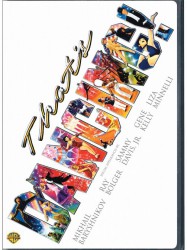
That's Dancing! (1985)
, 1h45Directed by Jack Haley Jr.
Origin USA
Genres Documentary, Musical
Themes Films about films, Dance films, Films about music and musicians, Documentary films about business, Documentary films about the film industry, Documentary films about music and musicians, Documentaire sur une personnalité, Musical films, Documentary films about films
Actors Gene Kelly, Liza Minnelli, Mikhail Baryshnikov, Sammy Davis Jr., Ray Bolger, Thomas William Smith
Roles From 'Yankee Doodle Dandy' (archive footage)
Rating71%






Terrible Joe Moran (1984)
, 2hDirected by Joseph Sargent
Origin USA
Genres Drama
Actors James Cagney, Art Carney, Ellen Barkin, Lawrence Tierney, Peter Gallagher, Mike Starr
Roles Joe Moran
Rating64%






Zelig (1983)
, 1h19Directed by Woody Allen
Origin USA
Genres Comedy, Documentary, Romance
Themes Political films
Actors Mia Farrow, Woody Allen, Susan Sontag, Caitlin O'Heaney, Patrick Horgan, Joséphine Baker
Roles Self (archive footage) (uncredited)
Rating75%





Set in the 1920s and 1930s, the film focuses on Leonard Zelig (Woody Allen), a nondescript man who has the ability to transform his appearance to that of the people who surround him. He is first observed at a party by F. Scott Fitzgerald, who notes that Zelig related to the affluent guests in a thick, refined accent and shared their Republican sympathies, but while in the kitchen with the servants he adopted a ruder tone, and seemed to be more of a Democrat. He soon gains international fame as a "human chameleon".

Dead Men Don't Wear Plaid (1982)
, 1h28Directed by Carl Reiner
Origin USA
Genres Thriller, Comedy, Comedy thriller, Action, Crime, Romance
Actors Steve Martin, Rachel Ward, Carl Reiner, Alan Ladd, Reni Santoni, Barbara Stanwyck
Roles (in "White Heat") (archive footage)
Rating67%





In the opening scene, John Hay Forrest (George Gaynes), noted scientist and cheesemaker, dies in a single-vehicle car accident (represented by the car wreck scene from Keeper of the Flame). In the next scene, private investigator Rigby Reardon (Steve Martin) is reading a newspaper when Forrest's daughter, Juliet (Rachel Ward), enters his office and faints when the paper's headline reminds her of her father's death. Upon coming to, she hires Rigby to investigate the death, which she thinks was murder. In Dr. Forrest's lab, Rigby finds two lists, one titled "Friends of Carlotta" and the other "Enemies of Carlotta", as well as an affectionately autographed photo of singer Kitty Collins, whose name appears on one of the lists. His search is interrupted by a man posing as an exterminator (Alan Ladd, in This Gun for Hire), who shoots Rigby in the arm and frisks the lists from the seemingly dead investigator.
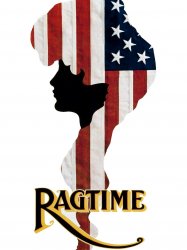
Ragtime (1981)
, 2h35Directed by Miloš Forman
Origin USA
Genres Drama, Historical
Themes Politique
Actors James Cagney, Brad Dourif, Moses Gunn, Elizabeth McGovern, Kenneth McMillan, Howard Rollins
Roles New York Police Commissioner Rhinelander Waldo
Rating72%





The film begins with a newsreel montage, depicting celebrities of the turn of the 20th century such as Harry Houdini, Theodore Roosevelt, and the architect Stanford White (Norman Mailer), as well as life in New York. The newsreel is accompanied by ragtime pianist Coalhouse Walker, Jr. (Howard E. Rollins, Jr.). The millionaire industrialist Harry Kendall Thaw (Robert Joy), who makes a scene when White's latest creation, a nude statue on the roof of Madison Square Garden, is unveiled. The model for the statue is Evelyn Nesbit (Elizabeth McGovern), a former chorus girl who is now Thaw's wife. Thaw becomes convinced White has corrupted Evelyn and humiliated him, and publicly shoots White, killing him.
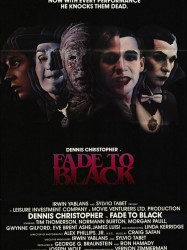
Fade to Black (1980)
, 1h40Directed by Vernon Zimmerman
Origin USA
Genres Drama, Thriller, Comedy, Horror comedy, Horror, Slasher
Themes Serial killer films, Comedy horror films
Actors Dennis Christopher, Tim Thomerson, Gwynne Gilford, Norman Burton, Linda Kerridge, Morgan Paull
Rating60%





Eric Binford is a hollow, chain smoking, ill-tempered young man who is also an obsessed film addict whose love of old films extends far beyond his job at a Los Angeles film distributor's warehouse and endless late night film screenings in his bedroom. For his vast knowledge, he's been bullied by his friends and family. His singular obsession eventually rounds the bend into psychosis after he crosses paths with Marilyn O'Connor (Linda Kerridge), an Australian model and a Marilyn Monroe look-alike who becomes the physical embodiment of his cinematic desires.
 , 2h13
, 2h13Directed by Gene Kelly
Origin USA
Genres Documentary, Musical
Themes Films about films, Films about music and musicians, Documentary films about business, Documentary films about the film industry, Documentary films about cities, Musical films, Documentary films about films
Actors Fred Astaire, Gene Kelly, Bud Abbott, Lou Costello, Lew Ayres, Stan Laurel
Roles (archive footage)
Rating72%





Gene Kelly et Fred Astaire présentent les meilleurs moments des films de la MGM.
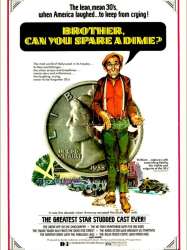 , 1h50
, 1h50Directed by Philippe Mora
Origin United-kingdom
Genres Documentary, Historical
Themes Documentary films about historical events
Actors Walt Disney, Bing Crosby, Marlene Dietrich, Charlie Chaplin, Fred Astaire, James Dunn
Roles Self (archive footage)
Rating70%





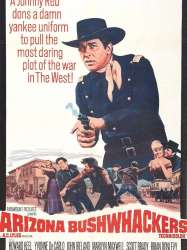
Arizona Bushwhackers (1968)
, 1h27Directed by Lesley Selander
Origin USA
Genres Western
Actors Howard Keel, Yvonne De Carlo, John Ireland, Marilyn Maxwell, Scott Brady, Brian Donlevy
Roles Narrator
Rating50%





Pendant la guerre civile, un espion confédéré prend un emploi comme maréchal d'une petite ville de l'ouest comme couverture pour ses activités d'espionnage. Cependant, il découvre bientôt qu'un homme d'affaires local vend des armes à un groupe d'Indiens déchaînés.

The Road to the Wall (1962)
, 33minutesOrigin USA
Genres War, Documentary
Themes Documentary films about historical events, Documentary films about cities
Actors James Cagney
Roles Narrator
Rating58%





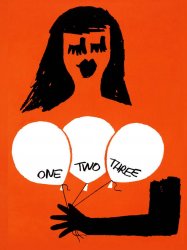
One, Two, Three (1961)
, 1h55Directed by Billy Wilder
Origin USA
Genres Comedy
Themes Political films
Actors Horst Buchholz, Pamela Tiffin, Arlene Francis, James Cagney, Liselotte Pulver, Howard St. John
Roles C.R. MacNamara
Rating77%





C.R. "Mac" MacNamara is a high-ranking executive in the Coca-Cola Company, assigned to West Berlin after a business fiasco a few years earlier in the Middle East (about which he is still bitter). While based in Germany for now, Mac is angling to become head of Western European Coca-Cola Operations, based in London. After working on an arrangement to introduce Coke into the Soviet Union, Mac receives a call from his boss, W.P. Hazeltine, in Atlanta. Scarlett Hazeltine, the boss's hot-blooded but slightly dim 17-year-old socialite daughter, is coming to Berlin. Mac is assigned the unenviable task of taking care of this young whirlwind.

The Gallant Hours (1960)
, 1h55Directed by Robert Montgomery
Origin USA
Genres Drama, War, Biography
Themes Seafaring films, Transport films, Aviation films, Political films, United States Armed Forces in films
Actors James Cagney, Dennis Weaver, Vaughn Taylor, Ward Costello, Richard Jaeckel, Les Tremayne
Roles Admiral William 'Bull' Halsey
Rating70%






Shake Hands with the Devil (1959)
, 1h51Directed by Michael Anderson
Origin USA
Genres Drama, Action
Themes Films about terrorism, Political films
Actors James Cagney, Don Murray, Dana Wynter, Glynis Johns, Michael Redgrave, Sybil Thorndike
Roles Sean Lenihan
Rating69%





Irish-American Kerry O'Shea (Don Murray) is studying at the College of Surgeons in 1921 Dublin, Ireland, during a guerrilla war - the Irish War of Independence. Apolitical and sick of killing after fighting in World War I, he is drawn into the struggle between the Irish Republican Army (IRA) and the British Black and Tans.
 Connection
Connection





